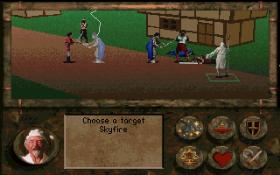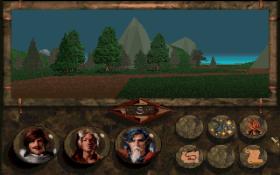EDIT- Since I noticed Joystiq linked here, these are the devs who quit we know about:
– Lawrence “Myrlokar” Poe
– Steve “Akkirus” Burke
– John “Kendrick” Capozzi
These three being all senior designers.
—
Whenever I hear about some dev quitting Vanguard I go check Krones, he always knows more, and never deludes me:
Another epic Vanguard beta leak has recently surfaced and the news is unfortunate. Myrlokar is the moniker of Lawrence Poe who held a senior design position with Sigil for at least two years. Considering Vanguard is still in the crucial stages of beta development this is a tremendous loss for “the vision”. Lawrence Poe was assigned particularly to: mechanics, combat formulas, contest formulas, build the rulesets for the way spell effects scale throughout the levels, item point system, etc. Basically all the formulas and math on the design side of things — In addition to designing the spell/ability tool and the item tool.
He brings along with him his wife, who apprarently worked at Sigil as well as AI/pathing coder.
Quitting job is popular these days! Join the bandwagon!
On the FoH’s forum where the rumor leaked there’s now a post from Brad, flaming someone for spreading bad hype (which seems to be a norm, recently. Your beta testers suck).
Cutting out the flames:
Boats, player owned ships, pirates, ever increasing AI complexity, etc. are all going in right now or have been in. I demo’d player owned ships to testers and at Fanguards (read: the public) MONTHS ago — who pray tell are you to come here and post that they are likely going to be cut when they’re already in-game? Did I nerf your class or an item back in the early EQ days or something? Enough already.
Right now we’re adjusting wind speeds, tweaking travel time between Thestra and Qalia, fixing a few bugs when ships travel between server regions, etc. Tweaking and smashing bugs, not implementing core systems.
I’ve watched beta testers sail up and down the river outside of Tursh. I’ve seen the AI using water pathing to move an NPC driven boat (e.g. pirates) displayed to me by the programmer working on it. Under no circumstances are they going anywhere but into this game by launch (and not just by launch, but people will be sailing them between continents and through archipelagos in the next phase of beta).
Lastly, flying mounts are something we plan to do for sure after launch, but may possibly get in before launch, but no promises. I have been crystal clear about managing these expectations on our message boards and elsewhere. To what end would you lump in a possible feature with something we’ve committed to, like player owned ships?
You exhibit a fundamental misunderstanding here between implementing a system and then later tweaking it based on feedback from beta and completely starting from scratch and throwing out everything that existed before. It seems as if there is no in-between for you, that a system is either implemented perfectly the first time or if that fails, a completely new system must be created from scratch to replace the old. This is patently false.
The tweaks we are doing to balance, to make combat more proactive yet still reactive when it needs to be, the adjusting of formulas and experience curves, making sure casual content is viable, etc. are simply that: tweaks. And not all of them unexpected — much of the data we needed to make these more final decisions could only be gained through beta testing. MMOGs are so complex, with so many variables interacting with each other, that until you have at least hundreds of people using multiple systems at the same time, you cannot simulate much of the feedback you really need (despite attempts to use automation, bots, etc. to help with some of these issues). Others still require thousands and a full server/world/shard.
Minimal work is being re-done from scratch, but rather the bulk tweaks and formula adjustments. In fact, many of the changes are made in the database – they are data driven and don’t even require coding changes. The biggest loss of time has probably been the UI, which should be ahead of where it’s at, and does require re-work as opposed to tweaking. That is something we are pushing hard to get into the game before the next phase of beta. Like I said, the combat tweaks, or at least the next round of them, will go in in a few weeks and then we’ll see how they play out, and then make tweaks again if necessary: classic beta testing 101. Did it in EQ, and doing it in Vanguard.
We’ve always advocated long betas and are involved in one right now. EverQuest was in beta 9 months. We have better tools now and are more experienced, yet Vanguard is a more complex game. So I don’t know when we’ll launch exactly, but both Sigil and Microsoft are committed to shipping a solid game.
Will that mean that the game is ‘done’? It depends on how you look at it. To me, the beauty of MMOGs is that you can always add to them, both content and features. So from that standpoint an MMOG is never done. Rather, an MMOG should be launched when you feel you have enough content and features and balance to provide a compelling game to those players who are your target audience. Additionally, when planning an MMOG early on, now that we know they can be commercially viable for 5, maybe even 10 years, MMOG developers should also do as much as possible to architect their engine, tools, and content plans such that adding both features and content to the game post-launch is as easy as possible. We didn’t do the greatest job with EQ in this regard, because we had no idea it would last so many years. With Vanguard, however, we have features and content planned for at least 4-5 expansions already. And much of that planning was done at the high level very early on so when we architected our technology and tools, the coding was done keeping in mind not just what the game might be like, or look like, or play like at launch, but far after launch. Player controlled flying mounts is a great example. We already have them in from a technology standpoint – I can enter beta right now, mount a drake, and fly several km into the air and look down at our largest city with negligible fps impact. I can fly around, traverse the entire world, swoop up and down, etc.
Why won’t I commit to launching with player flying mounts then? Because such a feature requires more then the tech that is its foundation, but also justifies some cool game mechanics to accompany being able to fly about where you will, as well as some logical restrictions. And so that may be added post launch as a freebie or part of an expansion or any number of ways. So yes, under that scenario, we would be using subscription revenue to finish player driven flying mounts.
The key, however, is that we never promised player driven flying mounts as a component of Vanguard that would be available by launch. So an MMOG is not only done when there is enough content and features and balance to make a compelling and fun game for your target audience at launch, but also when you’ve done your best to manage expectations… have done your best to make sure the features you felt were truly necessary are indeed there at launch and that while you’ve talked about future features or content, that if you are unsure as to when they’ll realistically be ready, that you are up front with your future playerbase about those items well before launching the game.
Well, it’s long but it doesn’t really says anything worthwhile. What about telling why the game’s suffering all these devs leakage instead?
The third paragraph I quoted sounds like this:
“I’ve seen things you people wouldn’t believe.
Attack ships on fire off the shoulder of Orion.
I watched C-beams glitter in the dark near the Tannhauser gate.
All those moments will be lost in time, like tears in rain.
Time to die.”





